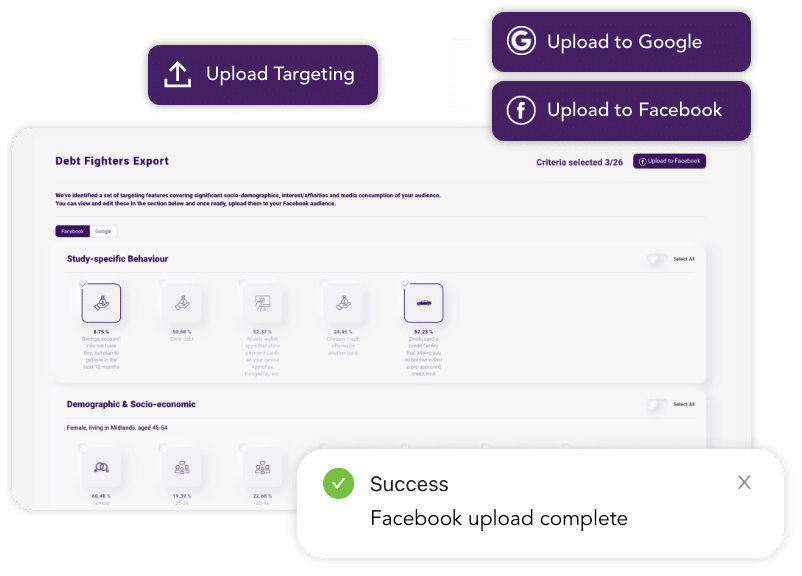Qudo vs the competition
How does Qudo compare against the competition? Check out this in-depth comparison where we show what are the advantages of using our new category of product: a Precision Activation Engine.


How does Qudo compare against the competition? Check out this in-depth comparison where we show what are the advantages of using our new category of product: a Precision Activation Engine.

With Qudo, we are launching a new category of saas tools in MarTech: Precision Activation Engines. Precision Activation Engines (PAE) are saas tools that offer data, insights, segments, and direct activation of those segments all in one platform, without any signal loss, and without needing your data.
As we are the first PAE on the market, there is no other tool that does exactly what Qudo does. But to help you compare our offering, we identified four main alternative categories that can be compared to Qudo:
| Qudo | Data Panels | 1st-party data tools | 3rd-party data tools | Ad Tools |
|---|---|---|---|---|
| Offers data, insights, segments, and direct activation of those segments all in one platform | Mostly offer vast amounts of raw data | Mostly used to collect and analyse user behaviour | Use third-party signals to identify audiences | Used to actively manage and monitor paid campaigns |
| Does not require your data or any signal loss | Require your data or third-party data sources | Require your data and may have signal loss | Rely on third-party data sources and may have signal loss | Require your data and may have signal loss |
| Improves ROAS by 300% with sophisticated targeting | Do not directly improve ROAS or targeting | May improve ROAS or targeting depending on the quality of your data | May improve ROAS or targeting depending on the quality of third-party data | May improve ROAS or targeting depending on the quality of your data and ad management skills |
Here are some examples of companies we can put into one of those four categories:
The above TL;DR table should give you an initial idea of how fundamentally different is Qudo compared to every other option. That should help you compare our unique proposition with some of the most renowned tools on the market. Each company has a slightly different offering, but the main points work all across. Let’s now dig into each category.
In short, the Qudo advantage…
Qudo gives you already analysed data out of the box. You don’t need to run analysis, apply algorithms, etc… what you need is ready to go the moment you log onto Qudo. All of the intelligence, zero of the work.
The largest data panels available online come with massive datasets covering almost all aspects of consumer markets. They are always available and usually offer extreme flexibility when it comes to working with the data.
They often use their own networks to collect zero-party data, and then integrate it with 3rd party data from partner networks.
PROS
CONS
In short, the Qudo advantage…
Zero-party data can cover opinions, preferences, ideas, drivers and barriers, psychometrics, which is what you need to create an ideal customer profile. Qudo is fully based on zero-party data, so it fills your marketing needs right at the beginning of your process.
Zero-party data tells you the “why”, while 1st party data tells you the “what”. Specifically, if you collect first party data, you should be able to have a detailed historical observation of your customers’ behaviour when they engage with your website/product/service.
Being able to observe how things went, for example, last quarter, is fundamental to stay on top of your customers’ needs and wants.
PROS
CONS
In short, the Qudo advantage…
Qudo uses zero-party data, which is data people give us knowingly and willingly. It’s 100% privacy regulations safe, it won’t disappear because of the cookie tracker apocalypse, and doesn’t upset users.
Zero-party data tells you the “why”, while 1st party data tells you the “what”. Specifically, if you collect first party data, you should be able to have a detailed historical observation of your customers’ behaviour when they engage with your website/product/service.
Being able to observe how things went, for example, last quarter, is fundamental to stay on top of your customers’ needs and wants.
PROS
CONS
In short, the Qudo advantage…
When it comes to map your market identifying segmentations and segments, campaigns tools can’t help you. They are great to collect results and optimise based on delivery, but they don’t give you an ideal profile out of the box, like Qudo does.
It’s very easy to get lost into dozens of campaign projections, budgets, reporting, and so on. Ad Management tools really solve that problem greatly. They also help you monitor your results, and they often help you make choices based on those results.
At the end of the day, Ad Management tools are similar to First-Party tools (they collect the data user generates by seeing/engaging with your ads), but are specifically tailored to help with all things PPC.
PROS
CONS

Adding {{itemName}} to cart
Added {{itemName}} to cart